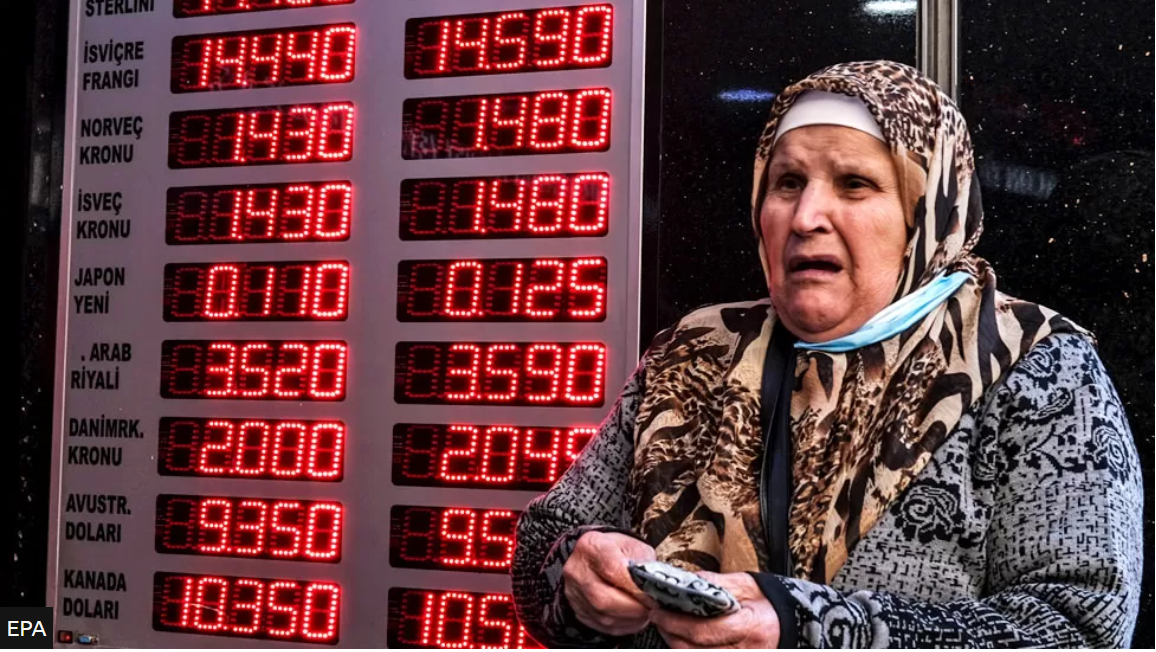Turkey’s widening external deficits, the steady bleed of Central Bank reserves and daily regulatory interventions by the Bank and banking regulator BRSA bordering on concealed capital controls have widely created the impression that the current level dollar/TL (19.20) is artificial and will have to change radically after the elections.
Over the weekend, Xinhua revisited the debate in a news item, which states: “Türkiye’s national currency lira may continue to weaken against hard currencies as the import-reliant country grapples with a growing current account deficit, Turkish economists have warned”.
Turkish economists are not alone in the TL-bearish forecast, in a recent report, Bank of America EM team, too, found the local currency overvalued:
“Our Compass model, which backs out fair values from a comparison of actual current account balances with their long-term norms, shows USDTRY’s fair value is about 24.
This suggests USDTRY could go even higher, as exchange rates often overshoot their fair values…”
Xinhua comments: “In the past few weeks, the lira has come under pressure and fallen to a new record low of 19 to the U.S. dollar on March 9 following several months of stability. On Wednesday afternoon the greenback was trading at 19.13 against the Turkish currency, showing a further dip.
U.S. investment bank Goldman Sachs issued in early March a warning about the possibility of volatility in the foreign exchange market in the lead-up to elections in Türkiye”.
Lira has lost some 70 percent of its value against the greenback since the beginning of 2022. COVID-19 pandemic, rising global oil prices, Türkiye’s growing imbalance in goods and services trade, which is evident in current account deficit, have combined to put the country’s economy in a vulnerable position.
The Turkish Central Bank has intervened regularly on the currency market to support the lira in the past year, using its foreign currency reserves, but this year the situation will be much more challenging.
The economic cost of the twin earthquakes that struck Türkiye’s south on Feb. 6 is estimated to be around 104 billion dollars, adding a very heavy burden on the economy.
“Hard currencies will be required to cover the financial expenses of the earthquakes, and if the current account widens, Türkiye will need additional foreign money to close the gap,” Enver Erkan, chief economist at Istanbul’s Dinamik Investment Securities, told Xinhua in a recent interview.
The good news is that earlier this month, Saudi Arabia agreed to deposit 5 billion U.S. dollars into the Turkish central bank in line with a recent diplomatic reconciliation with Türkiye.
Ankara could receive more funds in the run-up to elections from other oil-rich Gulf countries for its recovery efforts, according to Turkish media reports.
Islam Memis, an economy and currency analyst based in Istanbul, said in an article published this weekend on Turkish online newspaper TV100 that the lira may weaken to about 24 per dollar in the next six months.
“After the elections, regardless of who will come to power, we expect volatility in the currency market, Erkan said, echoing his forecast.
“These days, both interest rates and exchange rates are artificially suppressed. After the elections, regardless of the government, exchange rates and interest rates will inevitably rise and economic problems will continue,” Mustafa Durmus, another economist and scholar, said meanwhile on his YouTube channel.
Türkiye is approaching crucial general and presidential elections after the country’s worst-ever natural disaster last month killed more than 50,000 people and left millions homeless.
Incumbent President Recep Tayyip Erdogan is seeking a new term of five years against his main rival Kemal Kilicdaroglu, head of the Republican People’s Party, and joint presidential candidate for an alliance of six parties.
If no candidate secures more than 50 percent of the votes in the first round of the presidential vote on May 14, a second round will be held on May 28.
According to polls, it is going to be a close race. If Kilicdaroglu wins, he is expected to return to conventional economic and monetary policies to fight against high inflation which stands currently at 55 percent, dropping from 85 percent in October.
Erdogan has taken the unusual stand to lower interest rates to combat inflation, eyeing higher growth and exports. But his policies have exacerbated hardships for households faced with higher prices and chipped his popularity.
The Turkish leader has promised to rebuild earthquake-devastated areas in one year. For this, international funds may play a major role besides financial relief promised by the European Union and the United Nations.
Follow our English language YouTube videos
@ REAL TURKEY: https://www.youtube.com/channel/UCKpFJB4GFiNkhmpVZQ_d9Rg
And content at Twitter: @AtillaEng
Facebook: Real Turkey Channel: https://www.facebook.com/realturkeychannel/
